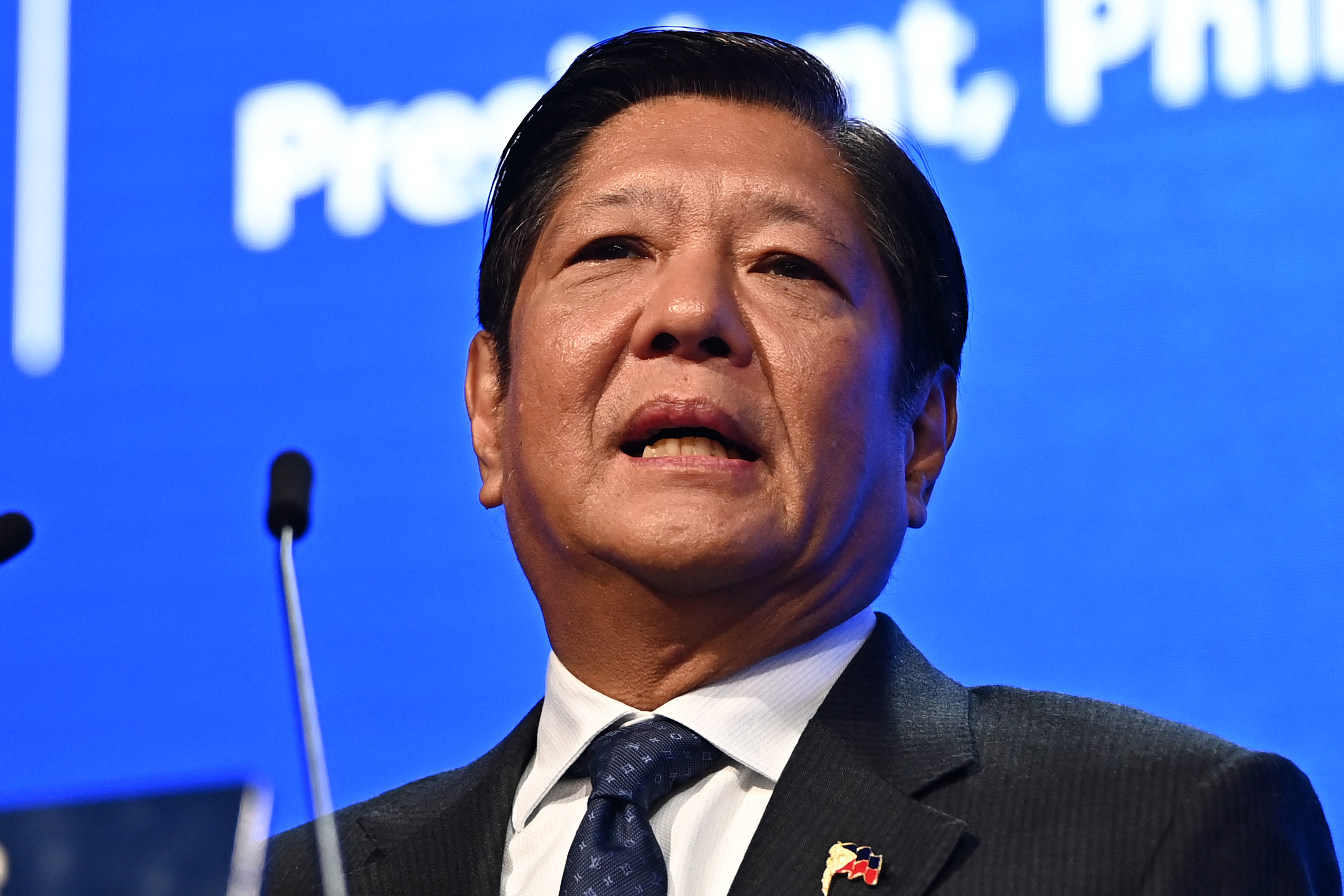Marcos rejects China’s claim that PH ruining regional peace

Philippine President Ferdinand Marcos Jr. delivers a speech during the 21st Shangri-La Dialogue summit in Singapore on May 31, 2024. —Photo by Nhac Nguyen/Agence France-Presse
SINGAPORE — President Marcos has rejected China’s accusation that the Philippines was ruining peace and stability in the South China Sea by allowing “other parties” to be involved in the maritime dispute in the strategic waterway which he said was now a global issue.
The President was responding to remarks made by Maj. Gen. Xu Hui, commandant of the Chinese military’s International College of Defense Studies, to his keynote speech on Friday at the International Institute for Strategic Studies (IISS) Shangri-La Dialogue in this city state.
Xu told Marcos that the Philippines’ recent “behavior” in dealing with the region’s maritime dispute indicated that Manila had considered “other parties’ comfort level,” which the Chinese general said would “risk ruining” the “long-lasting” peace established through the Association of Southeast Asian Nations (Asean).
READ: Marcos: PH won’t yield West Philippine Sea; to defend it at all cost
Keeping it bilateral
China claims nearly the entire South China Sea, including the West Philippine Sea, waters within the Philippines’ 370-kilometer exclusive economic zone (EEZ).
Article continues after this advertisementXu’s remarks were in keeping with Beijing’s stance that the maritime dispute over parts of the South China Sea, including large swaths of Manila’s EEZ, should be resolved bilaterally or within the framework of the Asean.
Article continues after this advertisementIn addition, China shuns “outside interference,” especially from those that are not parties to maritime conflicts in the South China Sea. As a result, Manila’s actions have been portrayed by China as “provocations” instigated by other parties not involved in the dispute, principally the United States and other countries sympathetic to the Philippines.
READ: Marcos says US presence crucial to regional peace
A global issue now
Marcos said the Philippines “still remains true to the principles” of the Asean, which is to create a bloc that have common interests, including creating partnerships that could help the region.
“I would even go far as to say there is no such thing as a regional issue any longer,” he said. “And when we talk about the South China Sea, we have to also remember that the South China Sea is the passageway for half of the world trade.”
“And therefore, the peace and stability of the South China Sea and the freedom of navigation of the South China Sea is a world issue,” he added.
Marcos said the whole world has become stakeholders in the peace and stability in the resource-rich waterway where an estimated $3.37 trillion worth of world trade passes annually.
US ‘crucial to peace’
The world, according to him, must examine the maritime dispute, so “we must include all parties in the discussion” because “the entire world has become stakeholders in the peace and stability in the region.”
In his speech to world leaders, top defense and security officials at the forum, the President said the “stabilizing presence” of the United States was “crucial to regional peace.”
With Lithuania PM
But Marcos also said China’s determining influence over the security situation and the economic evolution of the region were “permanent.”
“It is never a choice. Both countries are important,” he said. “The continued stability of this region requires China and the United States to manage their rivalry in a responsible manner.”
In his bilateral meeting with Lithuania’s Prime Minister Ingrida Šimonytė, the President said the Philippines would continue to uphold the international rules-based order in its maritime dispute with China.
“I don’t work for Beijing, I don’t work for Washington, I don’t work for Moscow. I work for Manila. I work for the Philippines and that’s what I need to promote,” Marcos told Šimonytė, whose country has imposed sanctions against Russia for its invasion of Ukraine.
The Lithuanian leader agreed that “international law matters because this is a safety network for small states.”
More joining PH drills
Gen. Romeo Brawner Jr., chief of staff of the Armed Forces of the Philippines, told reporters that more countries, including those from Europe, wanted to hold bilateral meetings and joint military exercises with the Philippines.
“We are happy about that because it only means to say that a lot of countries are interested in helping us with the situation. Not just interested to know what we think of the situation but really, they are offering us assistance, support,’’ he said. He said the Philippines could collaborate with these countries through military training, joint exercises and operations, and capability development.
Brawner, who met his counterparts from the United States and other countries here, said the Philippines was at the forefront of efforts “to make sure that we have a free Indo-Pacific, a free and peaceful Indo-Pacific.”
US, Japan coast guards
Philippine Coast Guard (PCG) chief Adm. Ronnie Gil Gavan said the United States and Japanese coast guards had been in talks with the PCG on how they could help it “do things better.”
On Saturday morning, Gavan and his counterparts from United States and Japan held a meeting, where they discussed, among other topics, China’s deployment of its 165-meter coast guard ship with bow number 5901, nicknamed “The Monster,” which is the world’s largest coast guard ship.
“I think all members, all civilized countries in this world are talking about it,” he said. “I think nobody is happy about it,” Gavan added, referring to the ship’s intrusion into the Philippines’ EEZ on May 24. —with reports from Agence France-Presse
For comprehensive coverage, in-depth analysis, visit our special page for West Philippine Sea updates. Stay informed with articles, videos, and expert opinions.